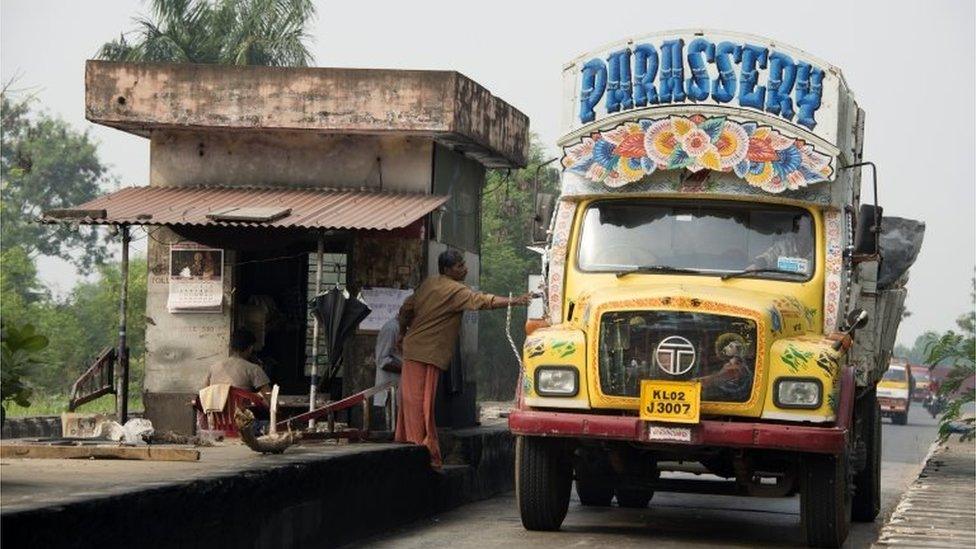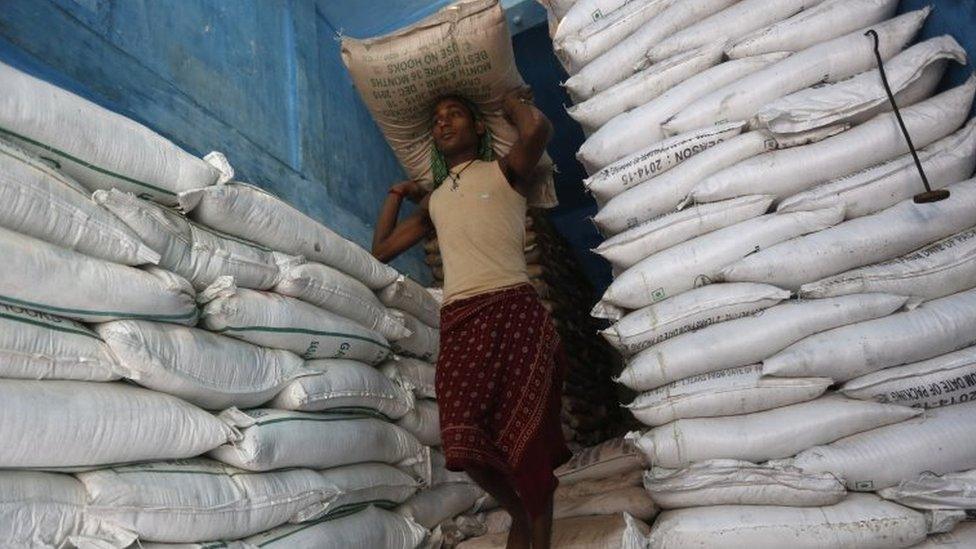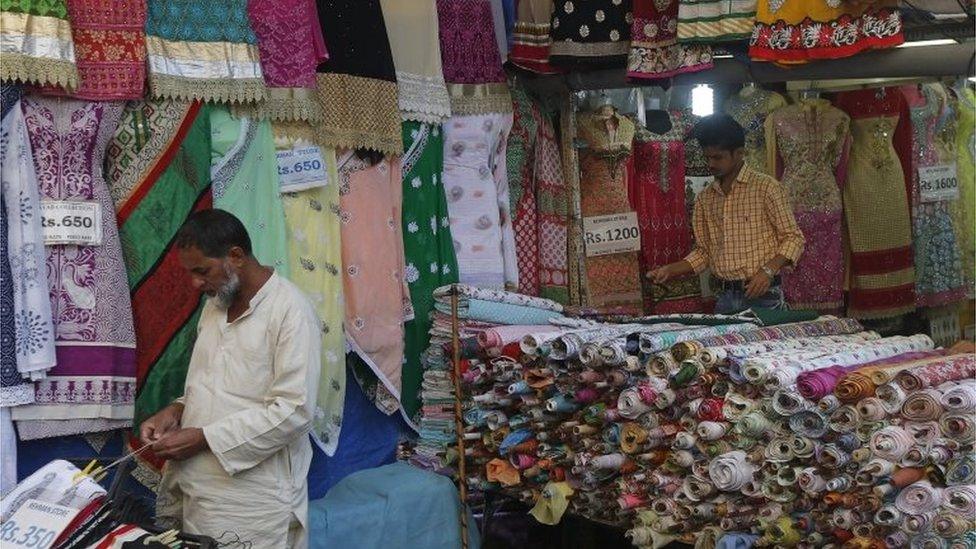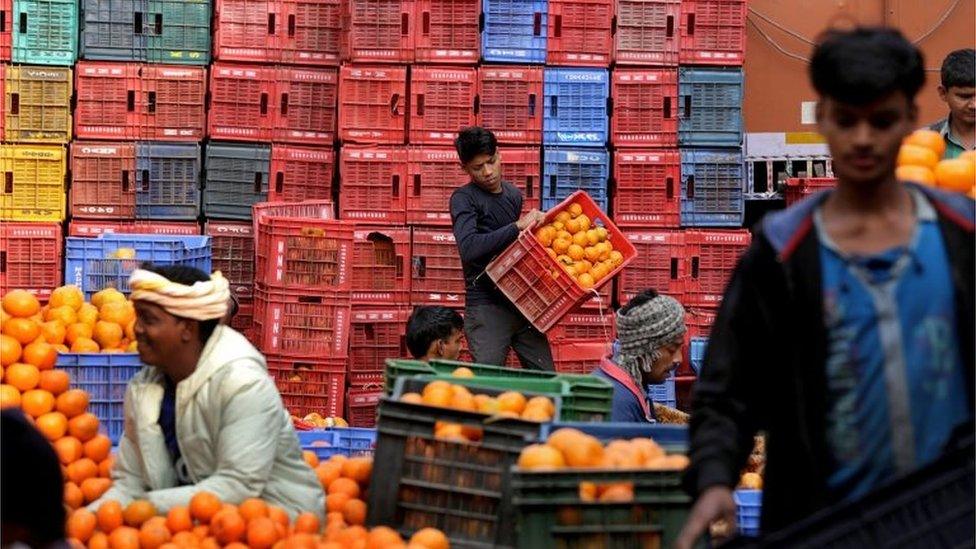Taxing democracy: Why easy decisions can be hardest to make
- Published

The average Indian trucker spends almost 60% of his time sitting in lay-bys
Democracies are good at all sorts of things, but not always at making decisions.
There's a perfect example of that here in India, the world's largest democracy.
There is a reform which would benefit virtually every Indian and which both main political parties agree should happen, yet which has been blocked in parliament for years.
So why is the country finding it so difficult to take a decision which should be so easy?
Fragmented markets
You might imagine that India, proud of its unity, would have a single common market. But it is actually far easier to transport goods between the nation states of Europe than it is to move a load across India.
Trucks are stopped at virtually every state border. The World Bank has estimated, external that the average Indian trucker spends almost 60% of his time sitting in lay-bys waiting for officials to work out what levies are due on his load.
That's because apart from the taxes imposed by the federal government, India's 29 states also have the power to raise duties on the sale of goods and services.
A proposal to streamline the system, harmonising all these different taxes into an all-embracing goods and services tax, or GST, has been knocking around for almost a decade.

The effects of a single tax on the Indian economy would be profound
The effects on the economy would be profound. All those trucks would suddenly be able to move much more freely around the country, all those complex layers of taxation would be stripped away and myriad opportunities for corruption would close.
Most economists agree it would deliver a spectacular boost to country's already robust growth rate.
One study found it could add as much as 2% to annual GDP growth: an extra $20bn (£14bn) a year from year one - nothing to sniff at.
With a bonanza like that on offer it is no surprise that both India's main parties - the ruling Bharatiya Janata Party (BJP) and Congress - have repeatedly said they would back a bill to reform GST.
Yet they have gone to extraordinary lengths to avoid doing just that in the last few years.
Who's afraid of reform?
One leading Congress politician is reported to have hidden in the parliamentary toilets a few months ago to avoid discussing how to progress on the GST bill with the BJP.
Though to be fair, the BJP pursued a similarly obstructionist policy when they were in opposition.
So why are Indian politicians wilfully conspiring to deprive ordinary Indians of the benefits of economic growth?
One powerful constituency is threatened by tax reform, India's state authorities.
Losing the ability to raise taxes represents a very significant diminution of their power.
The states control the upper house of parliament, the Rajya Sabha, and that's where the legislation is blocked.

One study found that GST could add as much as 2% to annual GDP growth
But the opposition of state legislators shouldn't be able to override the will of India's two main parties.
So what's going on?
Economist Kaushik Basu is not known for cynicism. He is the chief economist of the World Bank and the former chief economic advisor to the Indian government.
But, when I asked him why he thought the legislation hasn't been passed, he told me it was because the parties were following their own narrow self-interest.
Neither wanted "to hand the prize to the other", he said.
He believes the parties judge the political cost of gifting a 2% a year GDP fillip to their rivals outweighs any benefits to the people of India.
That kind of selfish political judgement isn't unique to India, he adds.
Citizens of most countries would be able to think of examples where a political party has been willing to make the nation suffer rather than see their rivals prosper.
Ugly reality
But it seems to me that there has to be a failure by another key player in a democracy to allow that to happen.
The electorate - the people - has to fail to engage with the issue.
If reform of GST was an important issue for ordinary Indians then there would be pressure - outrage even - at the political games being played in Delhi.
But the fact is that the intricacies of tax reform don't tend to fire up any electorate.
What's more - as the bill is currently framed, ordinary Indians would face a tax increase in the first couple of years after it is enacted.

The current bill is an ugly compromise
Not something designed to endear the electorate to the policy.
In fact, the current bill is such an ugly compromise that some economists believe it could create an even more complex regime than the one it seeks to replace.
All of which conspires to leave India in the extraordinary position of having a relatively straightforward measure that could dramatically increase growth but which fails to be enacted year after year.
This may be a particularly striking example, but the sad truth is that this doesn't actually tell us anything unique about India.
Unfortunately, all it says is that this country has the same failings as other democratic nations.
I've tried hard to resist the temptation to quote Winston Churchill, but I just can't.
"Democracy is the worst form of government, except for all the others that have been tried from time to time," he once said.
The malaise which has mired the Indian GST bill simply confirms Churchill's - ahem - "Churchillian" judgement on the limitations of the most successful form of government ever devised.
- Published26 February 2016
